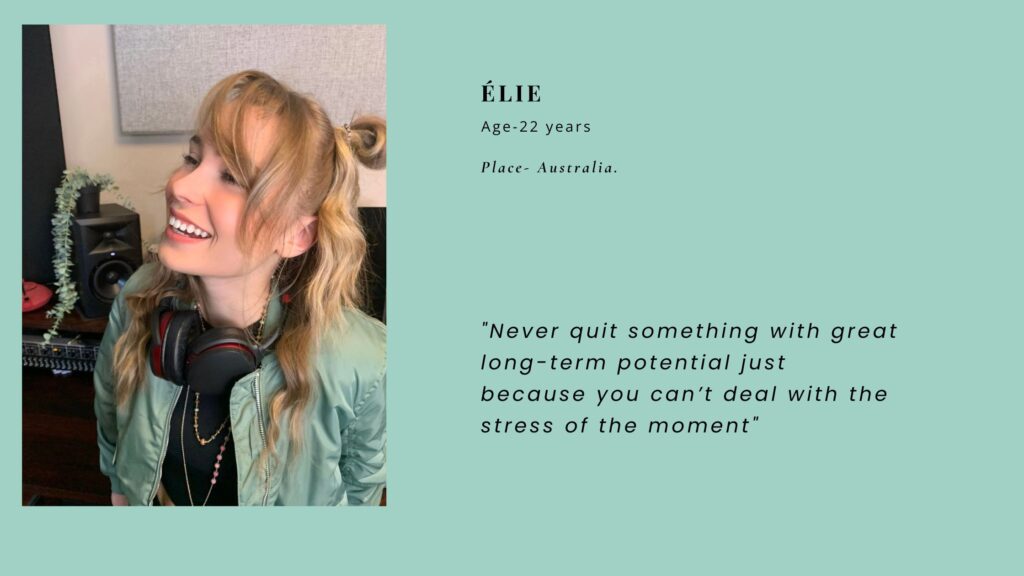Selection Stories
I love listening to songs, but honestly, I don’t know much about singers. What do they think, what kind of people are they, and what goes on in their minds—this has always been my curiosity. That’s why I thought of seeking help from a singer for a conversation on my blog. And that’s when I found Elie, an independent pop artist and producer from Australia. She writes, records, and produces everything herself. I’ve also shared her Instagram link below. Now, let’s dive into the conversation.

1. Do you think independent musicians today have more freedom, or more pressure because of algorithms and social media?
Élie: Both. There’s definitely more freedom now, in that you can create, release, and market your music entirely on your own terms without needing a label. That also means carrying the weight of doing everything yourself, which can be challenging but also really rewarding. I’d say the hardest part is finding a balance between working with algorithms, while still staying authentic to your art.
2. When did you first realize you wanted to become a singer?
Élie: I don’t remember a time when I wasn’t singing. Music was always just there for me, almost like a language I spoke before I could really articulate myself. I realized early on how much it helped me express myself in a way that words sometimes couldn’t, especially when it came to songwriting, so pursuing it felt less like a choice and more like a calling.
3. Who is your biggest inspiration in music?
Élie: It changes over time. I’ve always been drawn to artists who create whole worlds with their music, like Melanie Martinez or Lana Del Rey, who blur the line between music and visual storytelling, and pull you into their own cinematic universe that exists beyond the song. But inspiration also comes from everyday life—through conversations, films, even silent moments sometimes.
4. Do you prefer singing in the studio or on stage?
Élie: They’re completely different experiences. In the studio, it feels like you’re sculpting something carefully, almost like painting. On stage, it’s raw. You’re not thinking as much as you’re feeling. I love both, but there’s a special kind of magic in my studio when everything clicks, like when I finally capture a sound that’s been living in my head and bring it into the real world.
5. What advice do you have for someone starting in music?
Élie: Fail faster. Don’t wait for permission. Start creating now, with whatever tools you have, and let yourself be messy at first. It’s better to grow through doing than to overthink and stall.
6. What does music mean to you personally?
Élie: It’s connection. It’s the bridge between what I feel and what others might be feeling but can’t express. For me, music has always been a way of making sense of chaos inside or around me.
7. Has any of your songs been inspired by real-life experiences?
Élie: All of them. Even when they’re dressed up in metaphors or storytelling, the seed always comes from something real I’ve felt or witnessed. I don’t think I could write authentically any other way.
8. Do you think singing is more about talent or practice?
Élie: It’s both. Talent gives you a starting point, but practice is what refines it and keeps you going. Emotional connection is also really important—if you mean what you’re singing, people feel that.
9. How do you deal with stage fright or nervousness?
Élie: For me, it’s about reframing it; nervous energy is just excitement in disguise. Once I start, the nerves usually melt into adrenaline and connection.
10. In troubled relationships, there’s a thin line between pain and art. Do you think heartbreak makes better music than happiness?
Élie: That’s a really good question. I think heartbreak makes different music, not necessarily better. Pain has a way of breaking you open and demanding expression. It’s also such a universal feeling, and I think that’s why heartbreak songs often resonate; they mirror something almost everyone has experienced. But happiness has depth too. It just needs a different kind of honesty and a different headspace to put into words.
11. What does being successful mean to you, personally?
Élie: Success can mean a lot of different things. For me, it’s about growth, happiness, authenticity, love; loving and being loved, always evolving, staying grounded… Musically, I define success as being able to create art that feels true to me, and knowing it reaches the people who need it. If someone tells me a song helped them through something, that’s success.
———–Thank You———